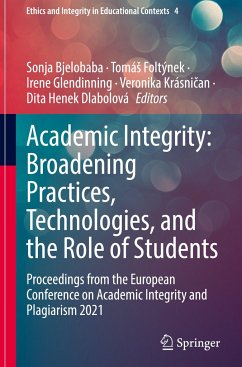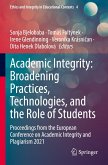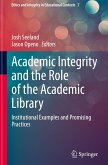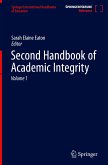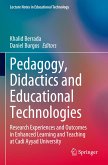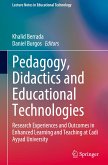Academic Integrity: Broadening Practices, Technologies, and the Role of Students
Proceedings from the European Conference on Academic Integrity and Plagiarism 2021
Herausgegeben:Bjelobaba, Sonja; Foltýnek, Tomás; Glendinning, Irene; Krásnican, Veronika; Dlabolová, Dita Henek
Academic Integrity: Broadening Practices, Technologies, and the Role of Students
Proceedings from the European Conference on Academic Integrity and Plagiarism 2021
Herausgegeben:Bjelobaba, Sonja; Foltýnek, Tomás; Glendinning, Irene; Krásnican, Veronika; Dlabolová, Dita Henek
- Gebundenes Buch
- Merkliste
- Auf die Merkliste
- Bewerten Bewerten
- Teilen
- Produkt teilen
- Produkterinnerung
- Produkterinnerung
This book aims to broaden the horizons of academic integrity by discussing novel practices and technologies, and the importance of student involvement in building a culture of academic integrity. Examples are the outreach efforts towards a range of non-educational organisations, the exploration and comparison of ethical policies and actions in different institutions, and the improvement of student responses in research on sensitive topics.
It explores a range of scenarios and strategies adopted in different parts of the world during the COVID-19 pandemic, and addresses new technological…mehr
Andere Kunden interessierten sich auch für
![Academic Integrity: Broadening Practices, Technologies, and the Role of Students Academic Integrity: Broadening Practices, Technologies, and the Role of Students]() Academic Integrity: Broadening Practices, Technologies, and the Role of Students116,99 €
Academic Integrity: Broadening Practices, Technologies, and the Role of Students116,99 €![Academic Integrity and the Role of the Academic Library Academic Integrity and the Role of the Academic Library]() Academic Integrity and the Role of the Academic Library131,99 €
Academic Integrity and the Role of the Academic Library131,99 €![Contract Cheating in Higher Education Contract Cheating in Higher Education]() Contract Cheating in Higher Education123,99 €
Contract Cheating in Higher Education123,99 €![Contract Cheating in Higher Education Contract Cheating in Higher Education]() Contract Cheating in Higher Education123,99 €
Contract Cheating in Higher Education123,99 €![Second Handbook of Academic Integrity Second Handbook of Academic Integrity]() Second Handbook of Academic Integrity363,99 €
Second Handbook of Academic Integrity363,99 €![Pedagogy, Didactics and Educational Technologies Pedagogy, Didactics and Educational Technologies]() Pedagogy, Didactics and Educational Technologies77,99 €
Pedagogy, Didactics and Educational Technologies77,99 €![Pedagogy, Didactics and Educational Technologies Pedagogy, Didactics and Educational Technologies]() Pedagogy, Didactics and Educational Technologies77,99 €
Pedagogy, Didactics and Educational Technologies77,99 €-
-
-
This book aims to broaden the horizons of academic integrity by discussing novel practices and technologies, and the importance of student involvement in building a culture of academic integrity. Examples are the outreach efforts towards a range of non-educational organisations, the exploration and comparison of ethical policies and actions in different institutions, and the improvement of student responses in research on sensitive topics.
It explores a range of scenarios and strategies adopted in different parts of the world during the COVID-19 pandemic, and addresses new technological advances for investigating types of academic misconduct that are difficult to find, including translation plagiarism, contract cheating, the usage of the proctoring systems, and the innovative use of data mining to detect cheating on on-line quizzes.
The work shows how working with students is an essential part of the fight against academic misconduct. The student voice can be a powerful source of motivation for students, but educators also need to understand their perspectives, especially regarding such an important topic as academic integrity.
It explores a range of scenarios and strategies adopted in different parts of the world during the COVID-19 pandemic, and addresses new technological advances for investigating types of academic misconduct that are difficult to find, including translation plagiarism, contract cheating, the usage of the proctoring systems, and the innovative use of data mining to detect cheating on on-line quizzes.
The work shows how working with students is an essential part of the fight against academic misconduct. The student voice can be a powerful source of motivation for students, but educators also need to understand their perspectives, especially regarding such an important topic as academic integrity.
Produktdetails
- Produktdetails
- Ethics and Integrity in Educational Contexts 4
- Verlag: Springer / Springer International Publishing / Springer, Berlin
- Artikelnr. des Verlages: 978-3-031-16975-5
- 1st edition 2022
- Seitenzahl: 392
- Erscheinungstermin: 2. Januar 2023
- Englisch
- Abmessung: 241mm x 160mm x 27mm
- Gewicht: 752g
- ISBN-13: 9783031169755
- ISBN-10: 3031169751
- Artikelnr.: 65008564
- Herstellerkennzeichnung Die Herstellerinformationen sind derzeit nicht verfügbar.
- Ethics and Integrity in Educational Contexts 4
- Verlag: Springer / Springer International Publishing / Springer, Berlin
- Artikelnr. des Verlages: 978-3-031-16975-5
- 1st edition 2022
- Seitenzahl: 392
- Erscheinungstermin: 2. Januar 2023
- Englisch
- Abmessung: 241mm x 160mm x 27mm
- Gewicht: 752g
- ISBN-13: 9783031169755
- ISBN-10: 3031169751
- Artikelnr.: 65008564
- Herstellerkennzeichnung Die Herstellerinformationen sind derzeit nicht verfügbar.
Sonja Bjelobaba is researcher at the Centre for Research Ethics & Bioethics as well as an associate professor in Serbian, Croatian, Bosnian at the Department of Modern Languages at Uppsala university. She is a vice-president of the European Network for Academic Integrity (ENAI) and co-ordinator of the Erasmus+ strategic partnership project Bridging Integrity in Higher Education, Business and Society (BRIDGE, 2020-2023). Previously, she has worked as international expert and course developer for the Council of Europe projects "Strengthening Integrity and Combating Corruption in Higher Education" in Montenegro and Serbia. She defended her thesis at the University of Gothenburg where she, as an educational developer, taught research integrity, postgraduate supervision courses and other courses for faculty relating to teaching and learning in higher education. Sonja Bjelobaba's research concentrates on academic integrity in the Balkans and in Sweden. Tomá Foltýnek is a lecturer at the Department of Computer Science, Faculty of Informatics, Masaryk University, Czechia. He is representing Czechia in the Council of Europe's Pan-European Platform for Ethics, Transparency, and Integrity in Education (ETINED). He has been dealing with plagiarism since 2008. He was involved in the design of an internal system for plagiarism detection for Mendel University in Brno and in several national and international projects on plagiarism and academic integrity. Since 2013 he has been organizing conferences on this topic. He is President of the Board of the European Network for Academic Integrity. Irene Glendinning is associate professor based in the Office of Teaching and Learning at Coventry University, serving as the institutional lead on academic integrity. She has been a teacher, lecturer, manager and researcher, working in secondary, adult, further and higher education, covering a period of over 40 years. Since 2010 she has mainly focused on research into strategies for academic integrity, particularly concerning the design of workable institutional policies that deter misconduct in education and research and encourage a culture of scholarly learning. She continues to be engaged in research and international working groups focusing on improving academic integrity and fighting corruption. As a member of QAA's Academic Integrity Advisory Group, she regularly contributes to national guidance in the UK and related events on this subject. She is a member of the editorial boards for the International Journal for Academic Integrity and Journal of Academic Ethics. Veronika Krásni¿an (earlier Králíková) is a Ph.D. student at the Department of Law and Social sciences at the Faculty of Business and Economics, Mendel University in Brno, dealing with business ethics. She is a leading expert on contract cheating in the Czech Republic. In 2017, she defended her master thesis on "Analysis of the contract cheating market in Czechia," for which she received a Dean's award. She was one of the principal investigators in the Global Essay Mills Survey, International Contract Cheating Project and shared her experience at the meeting of Council of Europe's Pan-European platform for Ethics, Transparency, and Integrity in Education (ETINED). Dita Henek Dlabolová is an executive manager of the European Network for Academic Integrity (ENAI). She is an experienced teacher and trainer in the field of academic integrity with the main focus on plagiarism prevention and detection. She has been involved in several international academic integrity projects. Her background is in computer science, before starting her job with ENAI she worked at Mendel University in Brno (Czechia) as an assistant professor teaching computer science and academic writing.
Preface.- The Editorial Team.- The Editorial Team.- Sections of the book.- Section 1: Broadening theories and practices of academic integrity (Sonja Bjelobaba).- Chapter 1. Academic integrity outreach efforts - making education accessible and inclusive (Zeenath Reza Khan, Michael Draper, Sonja Bjelobaba, Salim Razi and Shiva Sivasubramaniam).- Chapter 2. Understanding the enablers and barriers of ethical guidance and review for academic research (Shivadas Sivasubramaniam, Zeenath Reza Khan and Salim Razi).- Chapter 3. Comparison of institutional strategies for academic integrity in Europe and Eurasia (Irene Glendinning and Stella-Maris Orim).- Chapter 4. Researching academic integrity: designing research to help participants give genuine responses using quantitative and qualitative methods (Inga Gaizauskait , Irene Glendinning, Sonja Bjelobaba, Shiva Sivasubramaniam, Salim Razi, Zeenath Reza Khan, Laura Ribeiro and Lorna Waddington).- Section 2: Academic integrity in on-line education (Tomás Foltýnek).- Chapter 5. Students' perceptions of distance learning during the COVID-19 pandemic, and its effects on academic integrity (Mariya Chankova).- Chapter 6. Exploring models of online learning communities to expand academic integrity understanding in Chilean higher education (Beatriz Antonieta Moya and Sarah Elaine Eaton).- Chapter 7. Transitioning from face-to-face to online exams: devising a course-specific strategy to deter cheating (Phoebe Stavride and Angelika Kokkinaki).- Chapter 8. Assessing students online - enablers and barriers to using e-proctoring and alternative methods (Jarret Dyer, Zeenath Reza Khan and Christopher Hill).- Section 3: Academic integrity and technology (Dita Henek Dlabolová).- Chapter 9. Cross-language plagiarism detection: a case study of European languages academic works (Oleg Bakhteev, Yury Chekhovich, Andrey Grabovoy, Georgy Gorbachev, Tatiana Gorlenko, Kirill Grashchenkov, Andrey Ivakhnenko, Aleksandr Kildyakov, Andrey Khazov, Vladislav Komarnitsky, Artemiy Nikitov, Aleksandr Ogaltsov and Aleksandra Sakharova).- Chapter 10. Decision support for marker detection of Contract Cheating: an investigative Corpus Linguistic approach (Olumide Popoola).- Chapter 11. Data mining of online quiz log files: creation of automated tools for identification of possible academic misconduct in a large STEM course (Emma Spanswick, Marzena Kastyak-Ibrahim, Corey Flynn, Sarah Elaine Eaton and Nancy Chi).- Section 4: Student involvement in building a culture of academic integrity: Research about students (Irene Glendinning).- Chapter 12. Academic Integrity Socialization and Language Competency Training for Canadian Undergraduate Students during the COVID-19 Pandemic (Elaine Khoo and Michèle Irwin).- Chapter 13. Self-report of academic misconduct practices among university students in Portugal (Inês Morais Caldas, Maria Lurdes Pereira, Rui Azevedo and Áurea Madureira-Carvalho).- Chapter 14. Student values and attitudes to plagiarism in Montenegro (Marijana Blecic, Igor Lakic, Dijana Vuckovic, Sanja Pekovic, Bozidar Popovic and Rajka okovic).- Chapter 15. Transitional module on Academic Integrity to help K-12 students in the UAE prepare for next stage of education (Zeenath Reza Khan, Ajrina Hysaj, Serene John and Sara Khan).- Chapter 16. Compromising academic integrity in internationalisation of higher education (Erja Moore).- Section 5: Student involvement in building a culture of academic integrity: supporting students as researchers (Veronika Králíková).- Chapter 17. Academic ghost writing and commercial contract cheating provision on a freelancing website (Thomas Lancaster and Benjamin Dent).- Chapter 18. The role of students in the preservation of academic integrity (Pegi Pavletic and Martin Hammerbauer).- Chapter 19. The Role of Reddit Communities in Enabling Contract Cheating (Thomas Lancaster and Rahul Gupta).- Section 6: Celebrating breadth in research and action to support academic integrity (Teddi Fishman).- Chapter 20. Talking to a wall: The response of (German) universities to documentations of plagiarism in doctoral theses (Debora Weber-Wulff).- Concluding remarks (Sonja Bjelobaba).- Index.
Preface.- The Editorial Team.- The Editorial Team.- Sections of the book.- Section 1: Broadening theories and practices of academic integrity (Sonja Bjelobaba).- Chapter 1. Academic integrity outreach efforts - making education accessible and inclusive (Zeenath Reza Khan, Michael Draper, Sonja Bjelobaba, Salim Razi and Shiva Sivasubramaniam).- Chapter 2. Understanding the enablers and barriers of ethical guidance and review for academic research (Shivadas Sivasubramaniam, Zeenath Reza Khan and Salim Razi).- Chapter 3. Comparison of institutional strategies for academic integrity in Europe and Eurasia (Irene Glendinning and Stella-Maris Orim).- Chapter 4. Researching academic integrity: designing research to help participants give genuine responses using quantitative and qualitative methods (Inga Gaizauskait , Irene Glendinning, Sonja Bjelobaba, Shiva Sivasubramaniam, Salim Razi, Zeenath Reza Khan, Laura Ribeiro and Lorna Waddington).- Section 2: Academic integrity in on-line education (Tomás Foltýnek).- Chapter 5. Students' perceptions of distance learning during the COVID-19 pandemic, and its effects on academic integrity (Mariya Chankova).- Chapter 6. Exploring models of online learning communities to expand academic integrity understanding in Chilean higher education (Beatriz Antonieta Moya and Sarah Elaine Eaton).- Chapter 7. Transitioning from face-to-face to online exams: devising a course-specific strategy to deter cheating (Phoebe Stavride and Angelika Kokkinaki).- Chapter 8. Assessing students online - enablers and barriers to using e-proctoring and alternative methods (Jarret Dyer, Zeenath Reza Khan and Christopher Hill).- Section 3: Academic integrity and technology (Dita Henek Dlabolová).- Chapter 9. Cross-language plagiarism detection: a case study of European languages academic works (Oleg Bakhteev, Yury Chekhovich, Andrey Grabovoy, Georgy Gorbachev, Tatiana Gorlenko, Kirill Grashchenkov, Andrey Ivakhnenko, Aleksandr Kildyakov, Andrey Khazov, Vladislav Komarnitsky, Artemiy Nikitov, Aleksandr Ogaltsov and Aleksandra Sakharova).- Chapter 10. Decision support for marker detection of Contract Cheating: an investigative Corpus Linguistic approach (Olumide Popoola).- Chapter 11. Data mining of online quiz log files: creation of automated tools for identification of possible academic misconduct in a large STEM course (Emma Spanswick, Marzena Kastyak-Ibrahim, Corey Flynn, Sarah Elaine Eaton and Nancy Chi).- Section 4: Student involvement in building a culture of academic integrity: Research about students (Irene Glendinning).- Chapter 12. Academic Integrity Socialization and Language Competency Training for Canadian Undergraduate Students during the COVID-19 Pandemic (Elaine Khoo and Michèle Irwin).- Chapter 13. Self-report of academic misconduct practices among university students in Portugal (Inês Morais Caldas, Maria Lurdes Pereira, Rui Azevedo and Áurea Madureira-Carvalho).- Chapter 14. Student values and attitudes to plagiarism in Montenegro (Marijana Blecic, Igor Lakic, Dijana Vuckovic, Sanja Pekovic, Bozidar Popovic and Rajka okovic).- Chapter 15. Transitional module on Academic Integrity to help K-12 students in the UAE prepare for next stage of education (Zeenath Reza Khan, Ajrina Hysaj, Serene John and Sara Khan).- Chapter 16. Compromising academic integrity in internationalisation of higher education (Erja Moore).- Section 5: Student involvement in building a culture of academic integrity: supporting students as researchers (Veronika Králíková).- Chapter 17. Academic ghost writing and commercial contract cheating provision on a freelancing website (Thomas Lancaster and Benjamin Dent).- Chapter 18. The role of students in the preservation of academic integrity (Pegi Pavletic and Martin Hammerbauer).- Chapter 19. The Role of Reddit Communities in Enabling Contract Cheating (Thomas Lancaster and Rahul Gupta).- Section 6: Celebrating breadth in research and action to support academic integrity (Teddi Fishman).- Chapter 20. Talking to a wall: The response of (German) universities to documentations of plagiarism in doctoral theses (Debora Weber-Wulff).- Concluding remarks (Sonja Bjelobaba).- Index.

